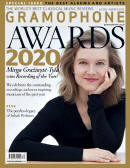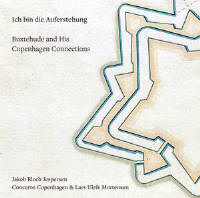Texte paru dans: / Appeared in: |
|
| Highly recommended. |
Outil de traduction (Très approximatif) |
|
Reviewer:
Andrew Mellor It’s a team that has garnered awards and nominations recently and is particularly workable in this repertoire, where every musician counts. We get a snapshot of music around the Baltic in the second half of the 17th century when many a German composer was lured north to Copenhagen, where Buxtehude studied while working at Elsinore. It was a time of ‘fearless innovation and bubbling creativity’, writes Jespersen in an extensive and meticulous booklet note. Experiments with form, he notes, would only develop into fixed conventions with future generations. That makes for some intriguing listening. Copenhagen town musician Andreas Kirchhoff’s Sonata a 6 is notable for its wide leaps and jerking dances – a proto-concerto grosso with stylus phantasticus tendencies. Matthias Weckmann was brought to Denmark by his teacher Heinrich Schütz. His strident Toccata in A minor bears the influence of Frescobaldi, and Lars Ulrik Mortensen revels in it, bringing his characteristic flair to his performance; Weckmann’s ecclesiastical concerto Kommet her zu mir has a parallel Italian influence, but not so much as the frolicking fanfares and temposhifts of Kaspar Förster’s Sonata a 7, which showcases CoCo’s excellent cornets just as Johann Erben’s Sonata sopra Ut, re, mi, fa, sol, la does its curvaceous strings. Förster’s Jesu dulcis memoria gets its first recording here, a touching precursor to the da capo aria in homage to Carissimi.
Jespersen is sensitive in that piece but really gets into his stride in the
Psalm 69 setting Gott hilf mir by Johann Meder, a German who wound up as
Kapellmeister in Riga. This is a striking, dramatic piece full of suspensions
and poetic reactivity. It may be that Meder, as cantor in Bremen and Hamburg,
sang Buxtehude’s Ich bin die Auferstehung und das Leben, itself a work
full of contrast in its description of the raising of Lazarus topped out by
Easter brass and cornets, splendid in its own Lutheran way. But the baritone is
at his best in the Psalm 57 setting by Nicolaus Bruhns. The composer would
apparently play the violin while accompanying himself on the organ’s pedals. In
Mein Herz ist bereit the tricky violin part can test CoCo’s Fredrik From
but Jespersen relishes the runs, declamation and description. There is so much
here to tweak the ear, not least the use of Chorton pitch, where A=465Hz.
Highly recommended. |
|




